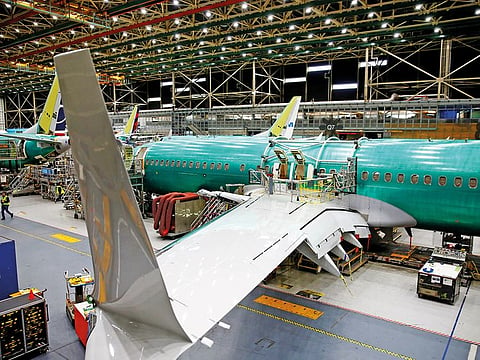Boeing says it needs more time to fix 737 Max software
Issue with integrating patch with flight control architecture arose during final audit

Washington: Boeing says it needs more time to finish a software upgrade for its grounded 737 Max jetliners as company engineers update a stall-prevention system linked to two fatal crashes in five months.
The aircraft-maker said last week it would submit final paperwork for the revamp to the Federal Aviation Administration by March 29 to make the computerised safety system — known as Manoeuvring Characteristics Augmentation System (MCAS) — less aggressive in pushing down an aircraft’s nose, and to add redundancy so that it’s less likely to activate when other systems malfunction. Now Boeing says the update won’t be ready until the “coming weeks.”
An issue with integrating the software fix and the aircraft’s existing flight-control architecture came to light as Boeing did a final audit of the upgrade, according to a person briefed on the work.
MCAS
Ensuring that MCAS will perform as desired while not interfering with existing flight controls isn’t expected to be a significant challenge, said the person, who wasn’t authorised to speak about the work and asked not to be identified.
“We are working to demonstrate that we have identified and appropriately addressed all certification requirements and will be submitting for FAA review once completed in the coming weeks,” Boeing said in an email Monday.
“Safety is our first priority, and we will take a thorough and methodical approach to the development and testing of the update to ensure we take the time to get it right.”
The FAA first announced that the proposed software upgrade wouldn’t be ready for weeks, and said the changes would face a rigorous review.
That bodes poorly for investors banking on Boeing quickly getting its single-aisle workhorse back in the air.
Software enhancement
“The FAA expects to receive Boeing’s final package of its software enhancement over the coming weeks for FAA approval,” the agency said.
“Time is needed for additional work by Boeing as the result of an ongoing review of the 737 Max Flight Control System to ensure that Boeing has identified and appropriately addressed all pertinent issues.”
The FAA said it would “not approve the software for installation until the FAA is satisfied with the submission.”
Boeing will also have to convince sceptical regulators in Canada, Europe, China and elsewhere of the system’s safety.
Boeing fell less than 1 per cent to $388.97 after the close of regular trading in New York.
The aircraft-maker’s stock has fallen 7.3 per cent since the Ethiopian Airlines crash, the worst performance on the 30-member Dow Jones Industrial Average.
Records sought
On Monday evening, the House Committee on Transportation and Infrastructure said it had sent letters to both Boeing and the FAA asking for records “related to the certification of the Boeing 737 Max Aircraft.”
“Understanding where things went wrong is critically important because tragedies like this should not happen,” the committee chairman, Pete DeFazio, an Oregon Democrat, said in a statement.
The 737 Max models were grounded on March 13 after similarities began to emerge between the crash on March 10 in Ethiopia and the one on October 29 off the coast of Indonesia. The disasters killed a combined 346 people.
MCAS pushed down nose of Lion Air jet
In the first crash, MCAS repeatedly attempted to push down the nose of a Lion Air jet as the result of a faulty sensor.
In the second, MCAS was also activated on an Ethiopian Airlines plane, according to reports last week in Bloomberg News and the Wall Street Journal.
Software patch
Boeing described the software patch, and the months of testing, in a briefing with reporters March 27 and a separate event the same day with pilots and industry officials.
Submitting the final paperwork to the FAA would be the last step in a certification plan the company outlined for the agency on Jan. 21.
The manufacturer said it had also conducted “thorough audits of all aspects of systems on the 737 Max with a particular focus on things that have changed” from the previous generation of the jets.
The study involved poring over hazard analyses, fault trees and other engineering studies of the Max.
The planemaker said that aside from MCAS, “there’s nothing else we’ve found at this point,” Boeing added.
The US planemaker, working with regulators, has already spent months refining the software, using feedback from computer simulations and flight-tests, after its initial approach proved more complicated than originally expected.
Air Canada removes Boeing's 737 MAX from schedule until July
Meanwhile, Air Canada said on Tuesday it has removed Boeing Co's 737 MAX planes from flight schedules until July 1, citing uncertainty about when the aircraft would be allowed to return to service.
The carrier said due to Transport Canada's continued closure of Canadian airspace to the aircraft, it has further adjusted its schedule to May 31.



